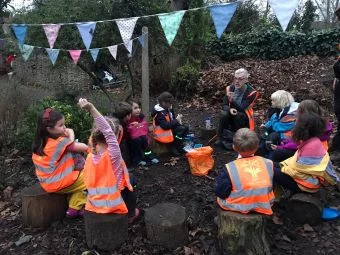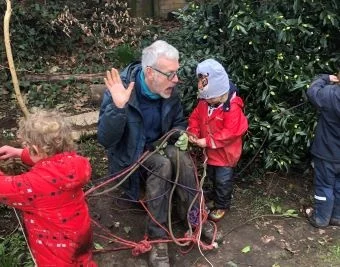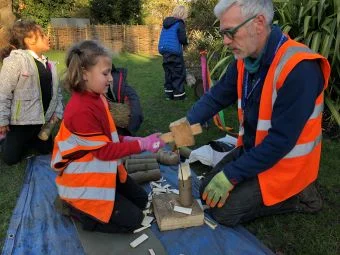In a new series of interviews, we’ll be speaking with our team members about outdoor play and it’s importance in the role of education. First up, we grilled our Setting Manager and outdoor learning master, Marlon Gibbins, about what drew him to outdoor learning and how we can bring it to our homes.
What made you change careers from being a teacher in a school to teaching in the outdoors?
Having trained as a teacher in Denmark my teaching has always been strongly influenced by the forest kindergarten and Udeskole movements. t was inevitable that I would be drawn into this style of teaching when the opportunity presented itself in the UK.
Why teach in the outdoors?
My experiences of working alongside some inspirational outdoor educators in Scandinavia most definitely set the stage for my approach to teaching. The outdoors is a much more forgiving environment for children to learn, enabling them to develop an understanding of the world around them at their own pace, following a natural rhythm through which they can find their own forms of expression. It provides limitless opportunities for children’s innate curiosity, they can explore, interpret, experiment and reflect in a way that relates to their individuality. It is specifically this non-directing ‘classroom’ that enables them to think creatively and develop the core skills that they will inevitably apply to their future learning and understanding.

Which parts of your training are the most important to you and why?
This is a tricky one to answer as undoubtedly I have been influenced by both theory and practice, that isn’t to say that everything holds the same value and importance. My teaching is a journey through which I am constantly developing my ideas based upon the experiences and knowledge I encounter, the key consideration is to reflect upon my existing practice and beliefs.
When it comes to Education – Process or outcomes? Why?
Good question, this is definitely a challenge in the UK. The process is far more important to me as an educator, particular for children during their early years. It can often be overlooked as it is more time consuming, it requires patience, engagement and consideration on the educators part. Through this way of learning a much deeper understanding is developed which in the longer term enables children to be much more innovative in their thinking, these are the creative minds that will be needed in the future.

Can children learn everything they need to know in the outdoors?
The outdoors is definitely a rich place for learning, and most importantly where children can connect with the natural world around them. It’s a playful environment that provides a calm and secure place for children to grow and were with the right support can develop a balanced range of skills, from self-regulation to problem-solving. There are of course some limitations to being outdoors, but these are relative to the importance placed upon them, it is often these limitations that provide the basis for progressive and innovative thinking.
How can we bring the principles of outdoor education into our London houses and flats?
It’s more about the skills and behaviours that children can apply when indoors. Having exposure to the outdoors does support children’s overall wellbeing and this is often reflected in their ability to sustain imaginary play, engage with limited resources and regulate themselves, particularly with technology.








